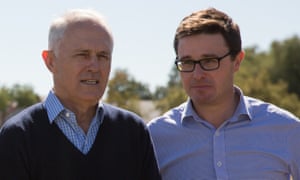Extract from The Guardian
David Littleproud says climate is changing and Australia must ‘use the best science available’
The agriculture minister, David Littleproud, says the climate is changing and the transition in the energy market – with renewables displacing traditional power generation sources – is “exciting, not only for the environment but for the hip pocket”.
In an interview with Guardian Australia, the Queensland National said the climate had been changing “since we first tilled the soil in Australia” and he does not care whether the change is due to human activity or not.
While some colleagues in the National party have long queried whether humans are contributing to global warming, and have been openly hostile to the advance of renewable energy, Littleproud said: “I’m not losing any sleep on that, whether you want to prove it is manmade or not – I want to be pragmatic.
“The climate has been changing since we first tilled the soil in Australia and the reality is farmers have been adapting to it,” the agriculture minister said. “Farmers are always at the cutting edge of science and technology, and they’ve been adapting since we first tilled the soil here.
“I believe the climate is changing. Whether it is manmade or not, I don’t really care. The reality is we are seeing disruption, particularly with renewables, and we are going to see cleaner air. I try not to live in cities, you do feel the effects ... so it’s a good thing that renewables are coming on.
“In fact, in my own electorate [of Maranoa in south-west Queensland] I’ve got all of the above. I’m about to have one of the largest solar farms in the southern hemisphere, one of the biggest wind farms in the southern hemisphere. I’ve got geothermal and I’ve got four coal-fired power stations. Two of those are super critical.
“The disruption that’s happening with the technology, moving towards renewable energy, particularly in storage for base load, is exciting. I think it is a good thing.”
While some government colleagues have championed prolonging the life of coal-fired power plants, Littleproud said economics rather than a culture war would ultimately determine Australia’s future energy mix. “Economics will win out in the end and if base load power can be stored in particular, that’s an exciting thing for the environment and everyone’s hip pocket.”
Littleproud has been on the road for much of the week with the prime minister, Malcolm Turnbull, visiting drought-affected regions of New South Wales and Queensland.
The south-east of Australia this year has experienced record high temperatures during an unseasonably dry and hot autumn, prompting fire bans and warnings from authorities.

In an interview with Guardian Australia, the Queensland National said the climate had been changing “since we first tilled the soil in Australia” and he does not care whether the change is due to human activity or not.
While some colleagues in the National party have long queried whether humans are contributing to global warming, and have been openly hostile to the advance of renewable energy, Littleproud said: “I’m not losing any sleep on that, whether you want to prove it is manmade or not – I want to be pragmatic.
“The climate has been changing since we first tilled the soil in Australia and the reality is farmers have been adapting to it,” the agriculture minister said. “Farmers are always at the cutting edge of science and technology, and they’ve been adapting since we first tilled the soil here.
“I believe the climate is changing. Whether it is manmade or not, I don’t really care. The reality is we are seeing disruption, particularly with renewables, and we are going to see cleaner air. I try not to live in cities, you do feel the effects ... so it’s a good thing that renewables are coming on.
“In fact, in my own electorate [of Maranoa in south-west Queensland] I’ve got all of the above. I’m about to have one of the largest solar farms in the southern hemisphere, one of the biggest wind farms in the southern hemisphere. I’ve got geothermal and I’ve got four coal-fired power stations. Two of those are super critical.
“The disruption that’s happening with the technology, moving towards renewable energy, particularly in storage for base load, is exciting. I think it is a good thing.”
While some government colleagues have championed prolonging the life of coal-fired power plants, Littleproud said economics rather than a culture war would ultimately determine Australia’s future energy mix. “Economics will win out in the end and if base load power can be stored in particular, that’s an exciting thing for the environment and everyone’s hip pocket.”
Littleproud has been on the road for much of the week with the prime minister, Malcolm Turnbull, visiting drought-affected regions of New South Wales and Queensland.
The south-east of Australia this year has experienced record high temperatures during an unseasonably dry and hot autumn, prompting fire bans and warnings from authorities.

In its latest winter outlook, the Bureau of Meteorology is forecasting warmer and drier-than-average conditions across large parts of the country. It suggests winter rainfall is likely to be below average for NSW, South Australia, northern Victoria and western parts of Western Australia.
Turnbull this week said there was “no doubt that our climate is getting warmer”. He said the farming community needed to concentrate on becoming more resilient and focus on adaptation to a climate that was getting warmer and drier.
Littleproud said there was a place for both mitigation strategies to try and reduce the most damaging impacts of climate change, and also for adaptation.
“No matter whether you mitigate or adapt, the climate is going to change and we’ve got to move with it,” he said. “You have to use the best science available at the time – you mitigate as best you can ... listen to the scientific evidence, because this should be predicated on science not emotion.
“If there are mitigation efforts to lessen the impact, then we should explore those, but we have to continue to adapt as we have since we first inhabited Australia.”
He said he was currently working with state counterparts in the agriculture portfolio to develop “a national strategy around climate change adaptation”, which would include better collaboration across state borders, more research and development, including developing more drought-resistant grains and fibres, and looking at the genetics of livestock, and “understanding the weather better”.
Asked whether some Australian farmers were hanging on in areas made unviable for agricultural production because of the impact of climate change, Littleproud said: “I think ultimately the market and economics determine that.
“I honestly believe, having been a bank manager that sat around farmers’ kitchen tables, the greatest custodians of the land are farmers because their profit and loss is intrinsically tied to the health of their land. They don’t make a quid unless their environment and their farming is at its best.”
He said farmers in drier areas were deploying active strategies, like reducing their stocking densities, and some farmers he had met in regional Queensland this week were also engaged with traditional owners about land management.
“They’ve learned how to manage that land, in some ways learning from how Indigenous Australians manage the land and techniques they’ve used,” he said.
Asked whether he accepted that agriculture and transport industries had to reduce their emissions to ensure Australia met its commitments under the Paris agreement, Littleproud said emissions reduction had to be “responsible”.
"I think we are already reducing emissions"
The latest official emissions data shows pollution increased by 1.5% in the year to December 2017. Australia’s emissions levels are now higher than they were in 2012 and have climbed by 3.6% since the carbon price was repealed in 2014.
Emissions are increasing in most sectors of the economy – in waste, agriculture and transport. Only one sector of the economy has recorded a decrease – the electricity sector – because ageing coal-fired power plants have exited the system, and new renewables projects are coming on stream.
“We’ve still got to be able to reduce the bills,” Littleproud said. “We’ve got to make sure the transition is done with people being able to turn their heaters on, and farmers turning their pumps on.
“I think we are already reducing emissions. We’ve made a commitment under the Paris agreement and we are moving towards that in a sensible and methodical way.
“As disruption happens in the technology space, [emissions reduction] will increase. In my own electorate, people are self-sustaining through solar. The reality is that type of disruption is happening and that is an exciting thing not only for the environment, but for the hip pocket.”

No comments:
Post a Comment